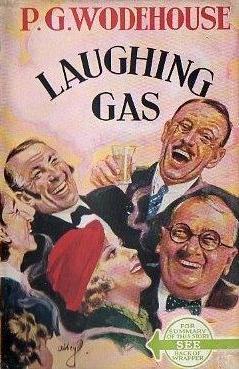
‘The Hitlers and Mussolinis of the picture world,’ said George, ‘What do they do? They ship these assortments of New York playwrights and English novelists out here and leave it all to them. Outside talent don’t get a chance.’
The quote above is self-referential. P. G. Wodehouse was both a New York playwright (in the musical comedy line) and an English novelist, and he had, indeed, been imported to Hollywood in 1929 to work on scripts for a while. He didn’t fit in and left little visible trace on celluloid, but he did mine the experience for comedy in his novels and stories. One of his most explicit Hollywood novels is Laughing Gas (which doesn’t seem to be available as an e-book, or even as a reasonably priced paperback, right now. But the link will take you to an audible book).
Reggie Swithin has recently inherited the title of Earl of Havershot, but he still hasn’t accustomed himself to that status. So he hasn’t the resistance to refuse the family solicitor’s request that he travel to Hollywood, California to disentangle his cousin Egmont from some American girl (who certainly must be inappropriate) to whom he’s gotten engaged.
On the train trip across the American continent, Reggie meets the beautiful April June, a famous movie star, who confides to him that she hates her life of glamor and longs for a simple home where she can be with her books and her flowers and her cooking… why, Reggie’s ancestral manor sounds like just the place!
Reggie is working up his nerve to propose to her as he arrives in Hollywood, where he meets the girl Cousin Eggy is engaged to – awkwardly, she turns out to be Ann Bannister, to whom Reggie himself was once briefly engaged. Then Reggie has an attack of toothache. In the dentist’s office, he finds that another Hollywood star, little Joey Cooley (“Idol of American motherhood”) is having the same procedure done by the dentist’s partner. As they are both under the influence of laughing gas at the same time, some sort of mix-up occurs (“probably in the fourth dimension,” Reggie thinks) and the soul of each transmigrates to the body of the other. Thus Reggie wakes to find himself very small, dressed in knickerbockers, and sporting long golden curls. He’s going to have to figure out how to live a child star’s life – which is made no easier by his guardian, a formidable woman who limits him to a diet based on prunes, to maintain his weight.
We only learn through hearsay what’s happening with Joey, in Reggie’s body, but the boy seems to have a good time. He can get all the sweets he wants now, and there are a lot of people he’s been dreaming of boffing on the nose; Reggie has a healthy young body with a good right arm and boxing training.
And so the story proceeds. Reggie will learn to view April June from a whole new perspective, and will also learn to appreciate ice cream and breakfast sausage in a whole new way. In the end, of course, everything will turn out for the best.
I have to admit I didn’t enjoy Laughing Gas as much as I remembered from my first reading, long ago. It’s not because the story is a poor one; it’s not. It’s just that, for personal reasons, I have trouble with stories about kids in general. It was interesting, though, to see how Wodehouse looked at Hollywood from personal experience.
Recommended, if you can find a copy.
